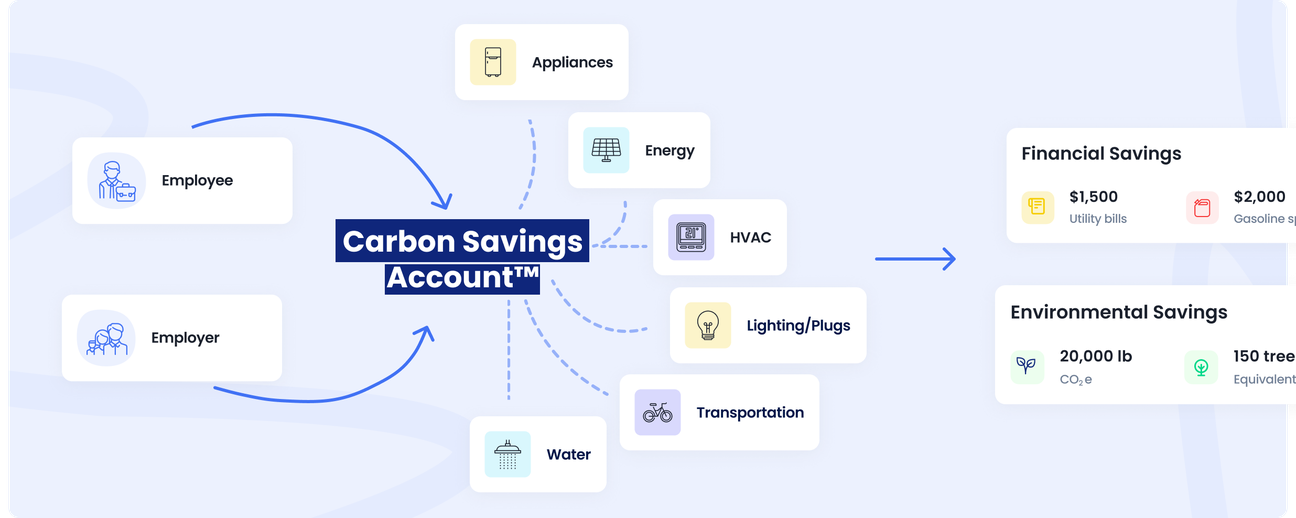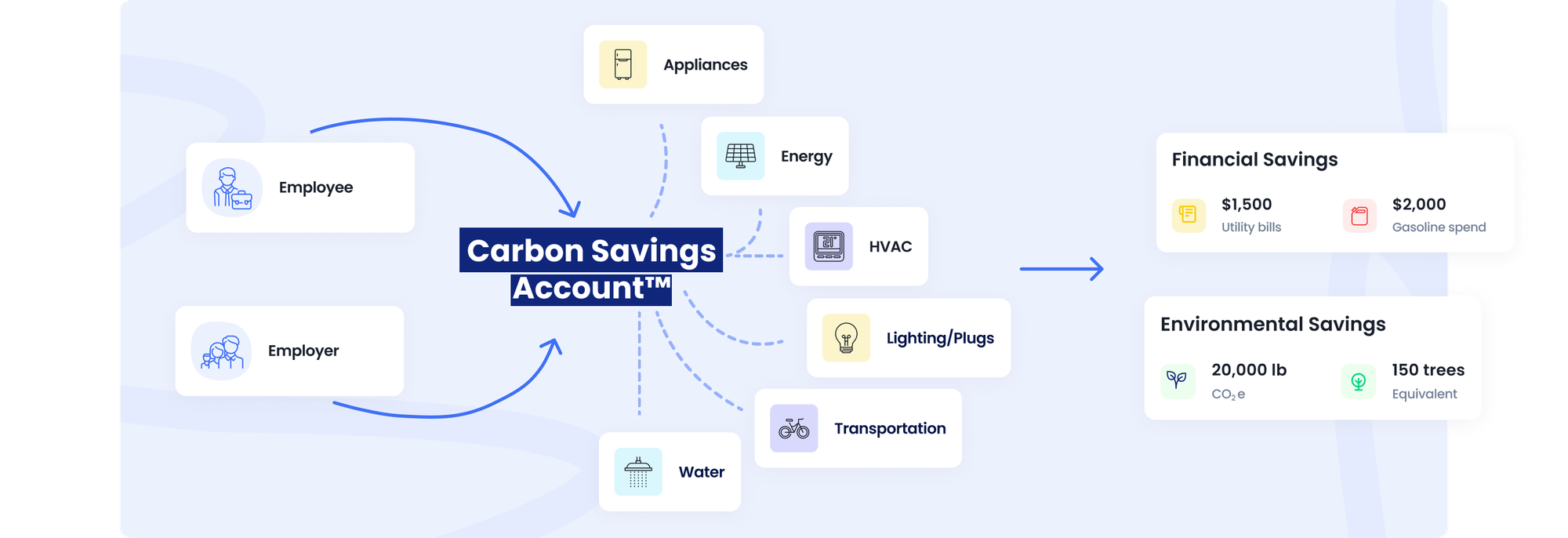Oct 18, 2023 • 4 min read
Introducing the Carbon Savings Account® (CSA)
 by , Co-founder, CEO
by , Co-founder, CEO

Scope Zero
We are Scope Zero.
Our mission is to make it a financial and logistical no-brainer for every individual to upgrade to efficient and electric home technology and personal transportation.
This is why we created the Carbon Savings Account® (CSA).
The Carbon Savings Account® (CSA) is a financial wellness benefit for employees and a corporate sustainability strategy for employers. Ultimately, the CSA provides strong financial incentives for employees to invest in home technology and personal transportation upgrades, all while reducing a company’s work-from-home and commute emissions.
The Carbon Savings Account® (CSA)
The Carbon Savings Account® (CSA) uses a simple and familiar employee benefit framework, similar to a health savings account. First, the employee and the employer both contribute funds to the account. Then, the employee uses their CSA funds for eligible home technology and personal transportation upgrades that reduce their utility bills, fuel spend, and carbon footprint.
With CSA upgrades, the average US home can save more than $5,000 per year.

How the CSA works for employees:
- Your employer gives you money to purchase home technology and personal transportation upgrades like a smart thermostat, low-flow shower heads, and electric vehicles.
- Scope Zero provides customized upgrade recommendations based on your budget and goals.
- Your home technology upgrades reduce your utility bills while increasing the value of your home. Your personal transportation upgrades reduce your fuel expenses.
How the CSA works for employers:
- You sponsor the CSA benefit and contribute matching funds to employees’ CSAs.
- You attract and retain top talent while directly reducing your work-from-home and commute emissions (scope 3).
Why does home technology matter?
The average US household spends over $3,000 per year on their energy and water bills. These bills can be even higher for homes in more expensive areas, homes with many occupants, large homes, and homes that serve as remote offices.
Utility consumption also plays a significant role in the health of our environment. In 2019, residential energy consumption was responsible for 20% of total US carbon emissions.
The average American home could reduce its utility consumption by 40% by simply upgrading to the latest efficient technology that already exists. But residents don’t make these upgrades for two reasons: the logistics are a headache and the financial incentives are inadequate or non-existent.
Logistical challenges with home technology upgrades
Logistically, the pain comes from the fragmented nature of the residential sector. The US has 130 million homes, and there are endless technology and contractor vendor options. The amount of time needed to shop for the most cost-effective efficient device is a burden that discourages optimal and timely home upgrades.
To ease the logistical burdens of home upgrades, our CSA platform provides customized upgrade recommendations for each employee. We also have a marketplace ecosystem that connects employees to vendors that provide CSA-eligible upgrades.
Financial challenges with home technology upgrades
Financially, capital costs of many home upgrades are expensive. If the average US home upgraded all of its standard home technology to the latest efficient models on the market, the payback time would be just under 24 years.
The CSA lowers the upfront costs of upgrades in two ways: employer matches (think health savings account), and referral discounts from our partner vendors within the CSA marketplace ecosystem.
Why does personal transportation matter?
Personal vehicle usage is responsible for about 13% of total US carbon emissions. The average US driver drives 13,000 miles per year. With a 2023 national average gas price of close to $3.50 per gallon, that’s $1,820 for a vehicle that operates at 25 miles per gallon.
Replacing personal vehicles with a bike or scooter completely eliminates this fuel expense, plus all the insurance, taxes, parking fees, etc. that come with car ownership. Using public transportation instead of a personal vehicle is also a great way to drastically reduce transportation expenses.
If fully replacing a personal vehicle with bikes, scooters, and public transportation is not feasible, an electric vehicle can significantly reduce transportation expenses.
Offer the CSA today!
Are you an employee or employer that is interested in having the CSA at your company? Schedule a call with Scope Zero to get started today.
Join our community
Sign up for our newsletter to stay up-to-date on all things Scope Zero.

Co-founder, CEO
Lizzy Kolar is Co-founder and CEO of Scope Zero. Lizzy holds a master’s degree in sustainable design engineering from Stanford University and a bachelor’s degree in mechanical engineering from West Virginia University. Lizzy developed her expertise in residential utility consumption as an engineer at Ameresco, where she designed cost-effective energy and water efficiency upgrades for military base housing across the United States. Lizzy is leading Scope Zero’s mission to reduce US residential utility bills by $100B per year, reduce personal vehicle fuel spend by $125B per year, and remove the emissions equivalent of 230M cars from the road.














